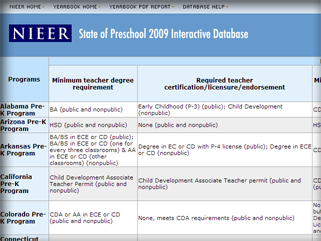
What the Yearbook Says About Teacher Qualifications
May 28, 2010
Findings from the 2009 State of Preschool yearbook indicate a slow down in the recent trend of increasing standards for teacher qualifications. Overall, for the 2008-2009 school year, 23 out of 38 states with pre-K programs failed to fully meet NIEER benchmarks for teacher qualifications. Qualifications include having a minimum of a BA degree and specialized training in early childhood education.
Consistent with the past two years, only 26 state-funded prekindergarten programs (out of 51) require their lead teachers to have a bachelor’s degree. However, almost all programs require specialized training in early childhood for their lead teachers (44 out of 51 programs). As states continue to deal with large budget deficits, there’s always the danger that current requirements could be watered down and/or eliminated from state policies. Proposals to upgrade teacher qualifications could also be put on the back burner.
During the 2008-2009 school year, there was a slight increase in the number of programs meetings the benchmarks for assistant teacher qualifications. Even so, only 14 out of 51 programs require assistant teachers to have at least a Child Development Associate credential or equivalent.
See how your state compares to these findings in this Yearbook teacher qualifications data table by clicking the image below. It contains information on types of required teaching certifications, in-service requirements, state supports for teacher education and salary information. For complete information on state-funded preschool programs, go to the 2009 Yearbook Interactive Database.
— Dale J. Epstein
Assistant Research Professor, NIEER

About NIEER
The National Institute for Early Education Research (NIEER) at the Graduate School of Education, Rutgers University, New Brunswick, NJ, conducts and disseminates independent research and analysis to inform early childhood education policy.
